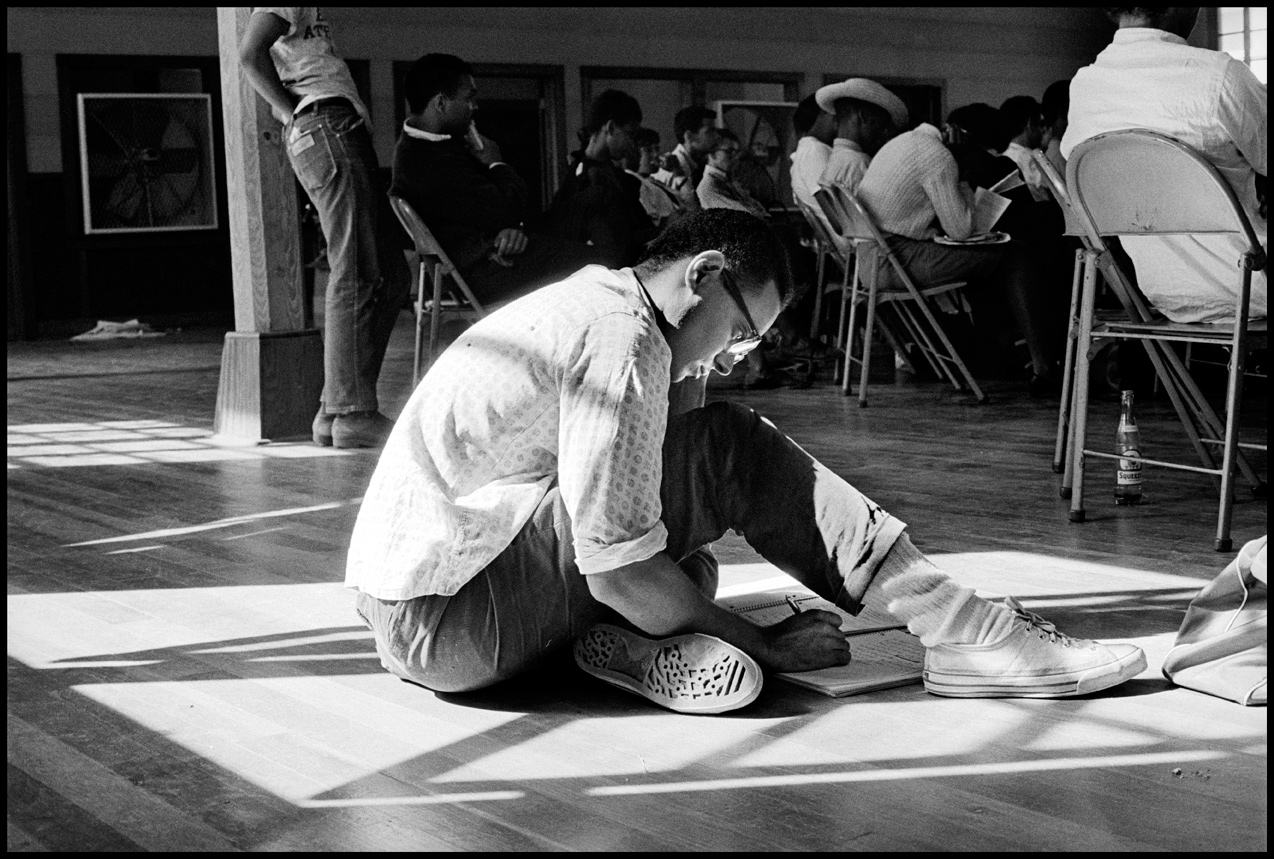Bob Moses
January 23, 1935 – July 25, 2021
Raised in Harlem, New York
“The sits-in woke me up,” recalled Harlem, New York-native Robert “Bob” Moses, discussing how his involvement with southern struggle began. When he first arrived in Mississippi in the summer of 1960, there was no student movement in the state. Moses was sent by Ella Baker to find students from the Deep South to participate in a SNCC conference that October in Atlanta. SNCC’s voter registration efforts began when Bob Moses met Cleveland, Mississippi NAACP president Amzie Moore, one of the people Miss Baker had put him in contact with. Moore decided to attend the October conference and placed the idea of voter registration on SNCC’s table.

Martha Prescod, Mike Miller, and Bob Moses (left to right) do voter registration work in the Mississippi countryside, 1963, Danny Lyon, Memories of the Southern Civil Rights Movement, 107, dektol.wordpress.com
Moses learned of the denial of Black voting rights from his discussions with Amzie Moore. “I was taught about the denial of the right to vote behind the Iron Curtain in Europe; I never knew that there was denial of the right to vote behind a Cotton Curtain here in the United States.” Moore also told Moses that he wanted to use the energy of the student activists in SNCC for voter registration. The young math teacher promised to come back the following summer after his classes at the Horace Mann school were out.
When Moses returned in 1961, Moore told him he was not quite ready to begin organizing in the Delta and sent him to his NAACP colleague, C.C. Bryant, in McComb. There, with other local community leaders, Bob Moses began SNCC’s first voter registration organizing effort.
What SNCC workers learned while working in that small Southwest Mississippi city, and the surrounding rural counties, forever shaped SNCC’s organizing style. Moses nurtured the development of local grassroots leaders, and he recognized the untapped potential power and unheard voice of locals who spoke up at meetings and participated in voter registration efforts. ‘‘Leadership is there in the people,’’ he said. ‘‘You don’t have to worry about where your leaders are, how are we going to get some leaders…If you go out and work with your people, then the leadership will emerge.”

Bob Moses at SNCC conference in Waveland, Mississippi, November 1964, Danny Lyon, dektol.wordpress.com
Reflecting back on the struggle years later, Moses said he also unexpectedly discovered that the organizing made him part of a family. As the summer of 1961 wore on, it became clear that no matter where SNCC workers went they would always have a bed, a hot meal, a ride, and, most importantly, protection from night riders.
What Moses learned from the early years in McComb would influence SNCC’s later activism in other parts of Mississippi, Southwest Georgia, Alabama, and Moses’s own Algebra Project, which stretched well into the twenty-first century. Moses designed the Algebra Project to use mathematics as an organizing tool to ensure quality public school education for every child in America. Now as then, he recognized that that the key to successful organizing was being welcomed into the community. By connecting with a core group of people who were willing to work with outsiders, together they could begin to make things happen. Despite the ongoing struggle, McComb became a defining moment in Moses’s career when he learned what needed to be done. “At the least,” he said, “we had begun to get our feet wet.”
Sources
Clayborne Carson, In Struggle: SNCC and the Black Awakening of the 1960s (Cambridge, MA: Harvard University Press, 1981).
Charles E. Cobb, Jr., This Nonviolent Stuff’ll Get You Killed: How Guns Made the Civil Rights Movement Possible (New York: Basic Books, 2013).
John Dittmer, Local People:The Struggle for Civil Rights in Mississippi (Urbana: University of Illinois Press, 1994).
Robert Moses with Charles E. Cobb, Jr., Radical Equations: Civil Rights from Mississippi to the Algebra Project (Boston: Beacon Press, 2002).
Charles M. Payne, I’ve Got the Light of Freedom: The Organizing Tradition and the Mississippi Struggle (Berkeley: University of California Press, 1995).
Laura Visser-Maessen, Robert Parris Moses: A Life in Civil Rights and Leadership at the Grassroots (Chapel Hill: The University of North Carolina Press, 2016).
Interview with Robert Moses by Howard Zinn, June 20, 1963, Howard Zinn Papers, Wisconsin Historical Society.
Interview with Bob Moses by Joseph Sinsheimer, November 19, 1983, Joseph A. Sinsheimer Papers, Duke University.




